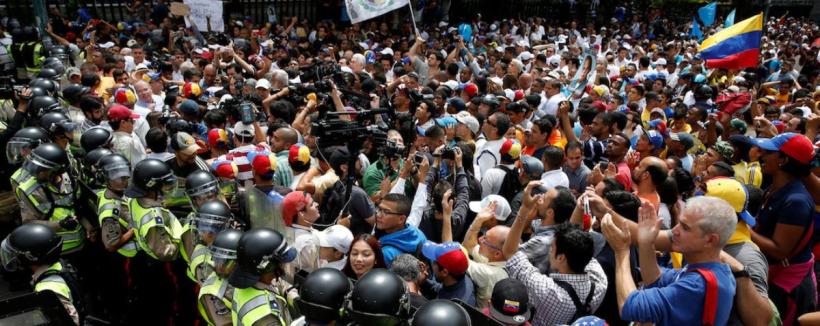Rudolf D’Silva
In the past few months a series of protests have erupted on the streets of Venezuela, leading to regular bursts of violence amongst protesters and police officials, as reported by Andrew Cawthorne of Independent news (Cawthorne, par. 2 & 9). Furthermore, it is reported that much of the violence is resulting from the economic collapse of Venezuela’s oil industry, making it difficult for the government to provide food imports for the countries populous, according to Flora Charner of CNN (Charner, par. 3). Several conservative media outlets, such as Fox News, have reported that the people of Venezuela believe the food shortage is the result of the countries socialist style government (Baier). However, many Venezuelan government officials, including president Nicolas Maduro believe this is nothing more than a coup, which has been instigated by American operatives within the country (Cawthorne 12).
Nonetheless, the violence which has emerged from protests has caused many families across Venezuela to not send their children to school, at least until the violence subsides (Cawthorne 19). Although the news articles do not state the reasoning why families are keeping their children from attending school, it can be reasonably presumed that families fear for their children’s safety. Although cities, such as Caracas, already have a reputation for being dangerous, the recent surge in violence, resulting from the protests and economic hardships, has led to a further rise in criminal acts such as robbery and murder (Charner 1-20). It is no wonder why parents are cautious about sending their children to school in Venezuela. It is likely most parents want to shield their children from the chaos ensuing throughout the country. Also, it is likely, parents are keeping their children from attending schools to protect them from physical harm, which may result while traveling to and from school, as well as while being in school.
Violence in any community largely affects student’s ability to gain a quality education. Although having inadequate time in a classroom setting influences how much any given student will learn, the drastic effects on education result from the hostile environment violence nurtures. The hostile environment violence fosters impact student’s ability to focus and retain precious information that may benefit students in their future. In the long run, hindering the educational quality of Venezuelan students could lead to a less productive nation. The economic situation in Venezuela, contributing to the protests and violence, is an issue the Venezuelan government will need to resolve soon in order to minimize the educational collateral which may result from it.
References
Charner, F. (2016, October 15). The face of hunger in Venezuela. CNN. Retrieved October 25, 2016, from http://www.cnn.com/2016/10/13/americas/cnnphotos-venezuela-food-crisis/
Cawthorne, A., & Ulme, A. (2016, October 27). Ozens injured as violent protests erupt in Venezuela against ‘incompetent autocrat’ President Maduro. Independent. Retrieved October 27, 2016, from http://www.independent.co.uk/news/world/americas/venezuela-nicolas-maduro-violent-protests-anti-government-demonstrations-caracas-a7382421.html
Rawlins, C. G. (2016, October 26). Opposition supporters take part in a rally against Venezuela’s President Nicolas Maduro’s government in Caracas[Photograph]. Reuters, Independent, Venezuela. https://news.vice.com/article/venezuelan-police-and-anti-government-protesters-clash-as-crisis-continues
Venezuela’s collapse prompts surge in asylum seekers [Video file]. (2016, September 20).Retrieved October 27, 2016, from https://www.youtube.com/watch?v=5DyV8xtQslM
